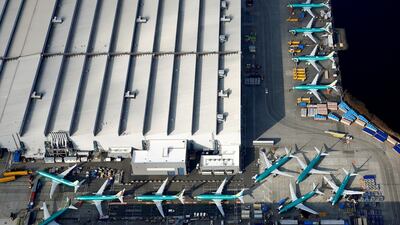Airline executives are gathering in Seoul under the shadow of the two-month Boeing 737 Max crisis, an escalating US-China trade war and higher oil prices threatening to slash the industry's profit this year.
The annual meeting of the International Air Transport Association (IATA), with more than 1,000 delegates, will kick off on Saturday, amid disagreement between global aviation regulators on the measures and timeline to return the idled Boeing Max jet into commercial service. The summit is also set against a backdrop of uncertainty around Britain's exit from the EU and geopolitical tensions-- factors threatening to dent air travel demand and hurt airlines' bottom line.
"The airlines will be meeting in challenging times: 2019 is expected to be the 10th consecutive year of airline profits, but rising costs, trade wars and other uncertainties are likely to have an impact on the bottom line," Alexandre de Juniac, IATA’s director general, said. "The prolonged grounding of the 737 Max aircraft is taking its toll. And aviation, like all industries, is under intensified scrutiny for its impact on climate change. The agenda will be full."
The 75th meeting of IATA on June 1-3, which represents about 290 airlines carrying 80 per cent of total global air traffic, provides indications of the industry's health and sets priorities for critical issues to tackle.
The aviation industry is expected to record a profit in 2019 for the tenth consecutive year but the gathering headwinds are likely to cloud the outlook. IATA's December forecast of $35.5 billion (Dh130.37bn) in airline profits for 2019 is widely expected to be revised downwards during the meeting. IATA will issue an updated forecast of passenger travel and air freight demand, which reflect consumer confidence and trade amid a weaker global economy.
The meeting is the first major airline gathering since the Boeing 737 Max grounding in March following two plane crashes that killed 346 people. The aftermath of the crisis involving Boeing's best-selling aircraft raised questions about aircraft safety, the planemaker's close ties to the US aviation regulator and the current plane certification process.
"International regulatory issues, coupled with an aircraft that’s key to many airlines growth plans, means the 737 Max issue is at the centre of things," Richard Aboulafia, analyst at Teal Group, said. "It’s hard to see how it wouldn’t dominate the conversation."
The Max grounding is having a "significant" financial and operational impact on airlines, Mr de Juniac said, although IATA does not yet have figures of the costs.
Airlines had to cancel flights, bear the cost of leasing other narrowbody jets and suffer reduced sales and disrupted schedules during the peak summer season that is critical for airlines' profits.
"Max fleets returning into operation in August means that schedules will not return to normal until summer 2020 because airlines have to submit their annual schedules six months in advance," Diogenis Papiomytis, a consultant at Frost & Sullivan, said. "So 2019 is now out of norm, and possibly the first quarter of 2020 too."
Regulators in Europe, China, Canada and others around the world decided to ground the Max before the US, creating a rift between regulators that is causing concerns among airlines and planemakers.
IATA is holding a meeting in five to seven weeks with Boeing, Max operators and regulators to discuss the conditions of the jet's return to service but cautioned it does not expect it to begin commercial flights before 10 to 12 weeks.
Rising cost of fuel, labour and infrastructure is the biggest challenge facing airlines this year, according to Mr de Juniac.
Among the list of concerns for IATA this year are the tougher economic conditions that could potentially lead to the collapse of more airlines, it said, following earlier casualties such as Iceland's Wow Air and India's Jet Airways.
Air traffic delays in Europe, higher infrastructure costs, reducing carbon emissions and improving gender diversity in the male-dominated industry are also expected to feature on IATA's agenda this year.


